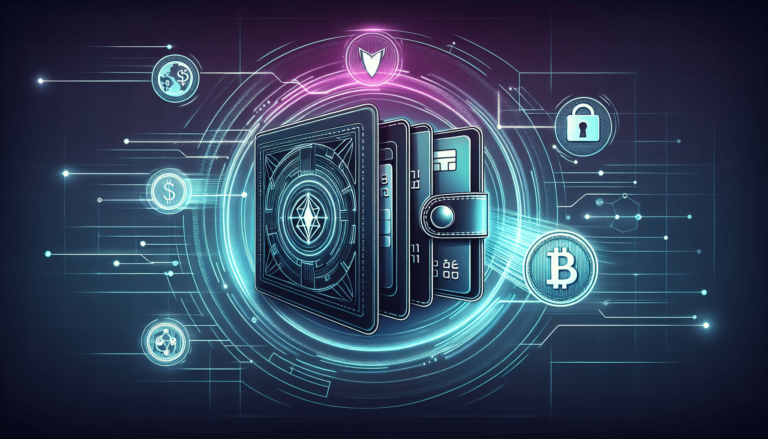What Is A Cryptocurrency Wallet?

Imagine having all your money securely stored in a virtual wallet that you can access anytime, anywhere. Sounds intriguing, doesn’t it? Well, that’s exactly what a cryptocurrency wallet is. In this article, we will explore the ins and outs of cryptocurrency wallets and unravel the mystery behind this innovative digital solution. Whether you’re a tech-savvy investor or simply curious about the world of cryptocurrencies, keep reading to discover what a cryptocurrency wallet truly entails.

Definition of a Cryptocurrency Wallet
Overview
A cryptocurrency wallet is a digital wallet that allows you to securely store, send, and receive cryptocurrencies. It is essentially a software application or a physical device that gives you access to your digital assets. Just like a traditional wallet holds your physical money, a cryptocurrency wallet holds your virtual currencies.
Definition
A cryptocurrency wallet is a tool that stores the private keys necessary to access and manage your cryptocurrencies. These private keys are unique alphanumeric codes that are mathematically linked to your digital assets, allowing you to securely interact with the blockchain network. The wallet itself doesn’t store the cryptocurrencies, but rather the keys required to access and authorize transactions involving your virtual currencies.
Types of Cryptocurrency Wallets
Hardware Wallets
Hardware wallets are physical devices that provide an offline and secure way to store your cryptocurrencies. They are often small, portable devices that resemble a USB drive. With a hardware wallet, your private keys are stored offline, making them less vulnerable to hacking or online threats. Popular hardware wallets include Ledger Nano S and Trezor.
Software Wallets
Software wallets are digital applications or programs that can be installed on your personal computer or smartphone. These wallets provide a convenient way to manage your cryptocurrencies, allowing you to easily send, receive, and store your digital assets. Software wallets are generally considered less secure than hardware wallets, as they are susceptible to malware or hacking attempts. Examples of software wallets include Exodus, Electrum, and MyEtherWallet.
Paper Wallets
paper wallets are physical printouts or handwritten copies of your cryptocurrency’s public and private keys. These wallets offer a high level of security as they are completely offline and not susceptible to hacking attacks. Paper wallets are usually generated through dedicated online services and can be an effective way to store your cryptocurrencies offline.
Mobile Wallets
Mobile wallets, as the name suggests, are wallets that are designed to be used on mobile devices such as smartphones or tablets. These wallets offer the convenience of being able to access your cryptocurrencies on-the-go. Mobile wallets often have user-friendly interfaces and are typically connected to the internet, allowing for easy transactions. Some popular mobile wallets include Mycelium and Trust Wallet.
Web Wallets
Web wallets are online wallets that can be accessed through a web browser. These wallets are often provided by cryptocurrency exchanges or third-party service providers. Web wallets are generally easy to use and convenient, as they can be accessed from any device with an internet connection. However, they are also considered less secure as they are vulnerable to hacking attempts. Examples of web wallets include Coinbase Wallet and Blockchain.com Wallet.
How Cryptocurrency Wallets Work
Public and Private Keys
Cryptocurrency wallets utilize a pair of cryptographic keys, known as a public key and a private key. The public key is used to receive funds, while the private key is used to access and authorize transactions involving your digital assets. The private key should be kept private and never shared with anyone, as it is the main factor that ensures the security of your wallet and funds.
Wallet Address
A wallet address is a unique identifier associated with a specific cryptocurrency wallet. It is similar to a bank account number or an email address, and it is used to receive funds from other individuals or entities. When someone wants to send you cryptocurrencies, they need to know your wallet address to initiate the transaction.
Transactions
When you want to send cryptocurrencies from your wallet, you need to create a transaction. This transaction includes the recipient’s wallet address, the amount of digital assets to be sent, and a digital signature generated using your private key. The transaction is then broadcasted to the network, and once it is confirmed by the network participants, the recipient’s wallet balance is updated accordingly.
Factors to Consider when Choosing a Cryptocurrency Wallet
Security
One of the most crucial factors to consider when choosing a cryptocurrency wallet is its security features. Look for wallets that offer two-factor authentication (2FA), biometric verification, or strong encryption to protect your private keys and funds. Hardware wallets tend to be the most secure option due to their offline storage and advanced security measures.
Usability
Consider the user interface and overall user experience of the wallet. Is it beginner-friendly? Can you easily navigate through the features and functions? A wallet that is intuitive and easy to use will make managing your digital assets a smooth and pleasant experience.
Supported Cryptocurrencies
Ensure that the wallet supports the cryptocurrencies of your choice. Different wallets may have different levels of support for various digital assets. It’s important to select a wallet that is compatible with the specific cryptocurrencies you intend to store or transact with.
Backup and Recovery
Look for wallets that offer backup and recovery options. Losing access to your wallet, whether due to hardware failure or accidental deletion, can be disastrous if you don’t have a backup. Wallets that allow you to easily backup and recover your private keys or have a seed phrase feature are highly recommended.
Multi-Signature Support
Multi-signature (multisig) wallets require multiple private keys to authorize a transaction. This added layer of security can provide additional protection against unauthorized access and can be useful for managing shared wallets or business accounts. If you require enhanced security, consider choosing a wallet that supports multi-signature functionality.
Community and Reputation
Do some research and check the reputation of the wallet provider. Are they well-known and trusted within the cryptocurrency community? Reading user reviews and getting feedback from the community can provide insights into the wallet’s reliability and reputation.

Popular Cryptocurrency Wallets
Ledger Nano S
The Ledger Nano S is a popular hardware wallet known for its security features and compatibility with a wide range of cryptocurrencies. It utilizes a secure chip and requires physical confirmation for transactions, providing an additional layer of protection.
Trezor
Trezor is another well-known hardware wallet that offers a high level of security and ease of use. It features a simple interface and supports a wide variety of cryptocurrencies. Trezor also provides password management features for added convenience.
Exodus
Exodus is a software wallet that offers a visually appealing and user-friendly interface. It supports multiple cryptocurrencies and allows for easy exchange between different digital assets within the wallet.
Electrum
Electrum is a popular software wallet for Bitcoin. It is known for its fast and secure transaction processing, as well as its compatibility with hardware wallets for added security. Electrum also supports multi-signature functionality.
MyEtherWallet
MyEtherWallet (MEW) is a web-based wallet specifically designed for storing and managing Ethereum and ERC-20 tokens. It provides users with full control over their private keys and offers features such as token swaps and integration with hardware wallets.
Metamask
Metamask is a browser extension wallet that allows users to interact with decentralized applications (dApps) on the Ethereum blockchain. It acts as a bridge between your browser and the Ethereum network, enabling seamless transactions and interactions with dApps.
Coinbase Wallet
Coinbase Wallet is a mobile wallet provided by the popular cryptocurrency exchange, Coinbase. It allows users to securely store and manage their cryptocurrencies while offering features such as decentralized identity and integration with decentralized finance (DeFi) applications.
Blockchain.com Wallet
Blockchain.com Wallet is a web-based wallet that supports multiple cryptocurrencies and offers a user-friendly interface. It provides features such as seamless integration with the Blockchain.com exchange and the ability to buy and sell cryptocurrencies directly from the wallet.
Steps to Set Up and Use a Cryptocurrency Wallet
Choose a Wallet
Start by researching and choosing a cryptocurrency wallet that fits your requirements. Consider factors such as security, usability, supported cryptocurrencies, and the reputation of the wallet provider.
Install and Set Up
If you’ve chosen a software wallet, you will need to download and install the wallet application on your computer or smartphone. Hardware wallets usually come with their own setup instructions. Follow the provided instructions to set up your wallet, create a password, and generate your private keys.
Create and Manage Wallet Addresses
Once your wallet is set up, you can create wallet addresses for the cryptocurrencies you intend to store. Each cryptocurrency will have its own wallet address. Your wallet should provide an option to manage and view your wallet addresses.
Back Up Your Wallet
Back up your wallet by following the backup instructions provided by the wallet. This usually involves writing down or securely storing your seed phrase or private key. This backup is essential in case you lose access to your wallet or encounter any other issues.
Send and Receive Cryptocurrencies
To receive cryptocurrencies, share your wallet address with the individual or entity that is sending you the funds. To send cryptocurrencies, enter the recipient’s wallet address, specify the amount, and authorize the transaction using your private key.
Security Tips
To enhance the security of your cryptocurrency wallet, consider the following tips:
- Use strong and unique passwords for your wallet and enable two-factor authentication (2FA) if possible.
- Keep your software and devices up to date with the latest security patches and updates.
- Be cautious of phishing attempts and only access your wallet through official websites or applications.
- Consider using hardware wallets for larger amounts of cryptocurrencies and keeping only small amounts in software or web wallets for everyday use.
- Regularly check for suspicious activity on your wallet and promptly report any unauthorized transactions or suspicious behavior to the wallet provider.
Risks and Security Measures for Cryptocurrency Wallets
Hacking and Phishing Attacks
Cryptocurrency wallets are vulnerable to hacking and phishing attacks. Attackers may try to gain unauthorized access to your wallet and steal your funds. To mitigate these risks, use strong passwords, enable two-factor authentication, and be vigilant of phishing attempts.
Malware and Keyloggers
Malware and keyloggers can infect your computer or smartphone and capture sensitive information, including your wallet’s private keys. Ensure your devices have up-to-date antivirus software installed and avoid downloading files or clicking on suspicious links.
Lost or Stolen Wallets
If you lose access to your cryptocurrency wallet or if it gets stolen, you may lose access to your funds. Regularly back up your wallet and store your backup in a secure and offline location. Consider using hardware wallets as they provide an extra layer of protection.
Hardware Wallet Risks
While hardware wallets are generally considered more secure than software or web wallets, they are not immune to risks. Ensure you purchase hardware wallets from trusted sources and do not share your recovery seed phrase or private keys with anyone.
Security Measures
To enhance the security of your cryptocurrency wallet, consider implementing the following measures:
- Use hardware wallets for long-term storage of larger amounts of cryptocurrencies.
- Keep your software wallets up to date and regularly check for any security updates.
- Enable two-factor authentication and use unique and strong passwords for your wallets.
- Use reputable security software to protect your devices from malware and viruses.
- Store your backup passphrase or private keys in a secure and offline location.
Future Developments in Cryptocurrency Wallets
Improved User Experience
As cryptocurrencies become more mainstream, wallet providers are continuously working on improving the user experience. This includes developing more intuitive interfaces, simplifying wallet management processes, and enhancing overall usability for both beginners and experienced users.
Integration with Decentralized Finance (DeFi)
The integration of wallets with decentralized finance (DeFi) platforms is expected to increase in the future. This integration will allow users to easily access and interact with DeFi applications directly from their wallets, thereby unlocking a wide range of financial opportunities in the crypto ecosystem.
Enhanced Security Measures
As the crypto industry evolves, wallet providers will continue to develop and implement more robust security measures. These may include advanced encryption techniques, multi-factor authentication options, and enhanced protection against hacking attempts and vulnerabilities.
Cross-Chain Compatibility
With the proliferation of different blockchain networks and cryptocurrencies, there is a growing demand for wallets that support multiple chains. This cross-chain compatibility will enable users to manage various digital assets from different blockchains within a single wallet, providing greater convenience and flexibility.
Conclusion
Cryptocurrency wallets are essential tools for securely storing, sending, and receiving cryptocurrencies. There are various types of wallets available, including hardware wallets, software wallets, paper wallets, mobile wallets, and web wallets. It is important to consider factors such as security, usability, supported cryptocurrencies, backup and recovery options, multi-signature support, and the reputation of wallet providers when choosing a wallet.
When setting up and using a cryptocurrency wallet, it is crucial to follow proper security practices and take precautions to protect your funds. Risks such as hacking, phishing attacks, malware, lost or stolen wallets, and hardware wallet vulnerabilities should be considered. By choosing a reputable wallet, implementing strong security measures, and staying informed about the latest developments in the crypto industry, you can ensure the safety of your digital assets and have a positive wallet experience.








